最新过去分词及练习
- 格式:docx
- 大小:49.12 KB
- 文档页数:16

过去分词作宾语补足语练习题过去分词作宾语补足语基本结构:See/hear/find/feel/have/make/keep/get/want/wish/would/like/with等+ sth(通常是物)+ V-ed (动词过去分词)一.过去分词作宾语补足语翻译练习1.我发现我的钱包被偷了。
2.我听见这首歌被唱了好几次3.我们看见那小偷被警察抓住了4.人们发现水被污染了。
5.我们已使我们的观点被他们知道6.我看见一个老人被撞倒了。
7.老师不希望这样的问题在课堂上讨论。
8.我们发现那人女孩一个人坐在那里9.Tom发现他穿着他哥的衣服10.工作做完了,他们出去玩去了11.该把你的衣服洗洗了12.我希望把房子粉刷成白色。
13.你应该设法让人听懂你的话。
14.太吵了,我的声音不被别人听见15.你有空时最好去把身体检查一下16.The day ended with nothing settled.17.I had my hand burned in the fire.18.I must have the work finished before Sunday.19.Please keep your mouth shut and your eyes open.20.When he woke up, he found himself tied to a big tree.21.You'd better have your MP3 repaired.22.They wanted themselves introduced in public23.Why don’t you get the job done by somebody else ?24.I want these things changed.25.The police found a car broken by the roadside.二.过去分词作宾语补足语选择练习注意:有部分题目为对比题,请认真比对!!!1. I don’t want the children ____ out in such weather.A. takeB. to takeC. takenD. taking2. I don’t want ____ the children out in such weather.A. takeB. to takeC. takenD. taking3. John received an invitation to dinner, and with his work _______, he gladly accepted it.A. finishedB. finishingC. having finishedD. was finished4. Helen had to shout ______ above the sound of the music.A. making herself hearB. to make herself hearC. making herself heardD. to make herself heard5. Helen had to shout ______ above the sound of the music.A. making others hearB. to make others hearC. making others heardD. to make others heard6. Can you have the washing-machine______to my house?A. sendB. to sendC. sentD. sending7. Can you have someone ______ the washing-machine to my house?A. sendB. to sendC. sentD. sending8.She wants her paintings ______ in the gallery, but we don t think they would be very popular.A. displayB. to displayC. displayingD. displayed9.She wants ______her paintings in the gallery, but we don t think they would be very popular.A. displayB. to displayC. displayingD. displayed10. It is wise to have some money ____ for old age.A. put away 预留B. putting awayC. putted awayD. to put away11. It is wise to ____some money for old age.A. put awayB. putting awayC. putted awayD. to put away12. I’m afraid that I can’t make myself ____ because of my poor English.A. understandB. understandingC. to understandD. understood13. I’m afraid that I can’t make the foreigners ____ me because of my poor English.A. understandB. understandingC. to understandD. understood14. Mother didn’t leave until she saw her child ____ the street and ____ the school gate.A. crossing; enteringB. crossing; enterC. cross; enteringD. cross; enter15. We should keep them ________ of what is going on here, so we must keep in touch with them.A. informingB. informedC. to informD. being informed16. The manager asked me whether I knew the man with his hair ______ back.A. tiedB. tyingC. to cutD. cutting17. Without the job ________, I wouldn't dare to go home.A. finishingB. finishedC. to finishD. being finished18. With the job ________, I didn’t have time to go home.A. finishingB. finishedC. to finishD. being finished19. With somebody ________ the job, I had time to go home earlier.A. finishingB. finishedC. to finishD. being finished20. Without ________ the job , I wouldn't dare to go home.A. finishingB. finishedC. to finishD. being finished21. At any rate, I did not succeed in making myself ___ by you.A. understandB. understoodC. understandingD. to understand22. At any rate, I did not succeed in making you ___ me.A. understandB. understoodC. understandingD. to understand23. He was disappointed to find his suggestion ________ down, so he had to keep silent.A. being turnedB. turnedC. to be turnedD. to turn24. The manager said that no matter what happened, he ________ thework ________ within 12 hours.A. would have; finishedB. would have; finishC. might have; endD. would have; do25. —May I know what time by your watch? —I had mine __ on the bus yesterday.A. missingB. stealC. stolenD. to be stolen26.--- Good morning. Can I help you? --- I'd like to have this package _____, madam.A. be weighedB. to be weighedC. weighD. weighed27.--- Good morning. Can I help you? --- I'd like to have you_____ this package, madam.A. be weighedB. to be weighedC. weighD. weighed28. The master was very angry and had all the servants ___ before him.A. to be broughtB. be broughtC. broughtD. being brought29.The murderer was brought in, with his hands _____ behind his back.A. being tiedB. having tiedC. to be tiedD. tied30.The murderer stood there, with some policemen_____ his hands behind his back.A. being tiedB. having tiedC. to be tiedD. tied31. M father encouraged me in painting, but he never loved to see any of my works __ in public.A. exhibitionB. exhibitedC. having exhibitedD. being exhibited32.The speaker raised his voice but still couldn't make himself ___ .A.hear B. to hear C. hearing D. heard33.The speaker raised his voice but still couldn't make the audience(观众)___ him .A.hear B. to hear C. hearing D. heard34. Lucy has a great sense of humor and always keeps her colleagues with her stories.A. amused 逗乐B. amusingC. to amuseD. to be amused35.He looked around and saw a man ____ his hand into the pocket of a passenger.A. putB. to be puttingC. to putD. putting36. Those who have questions______,raise your hands.A. askB. to askC. askedD. asking37.Alexander tried to get his work _______in the medical circles.A. to recognizeB. recognizingC. recognizeD. recognized38.He didn’t keep on asking me the time any longer as he had had his watch ______.A. to repairB. repairedC. repairingD. repair39.He didn’t keep on asking me the time any longer as he had had somebody______his watch.A. to repairB. repairedC. repairingD. repair40. In the past few years, we have had thousands of trees ____ around our school.A. plantB. plantedC. plantingD. being planted41. In the past few years, we have ____ thousands of trees around our school.A. plantB. plantedC. plantingD. being planted42. John rushed out in a hurry, ____ the door ____.A. leaving; unlockedB. leaving; unlockingC. left; unlockedD. to leave; unlocked43. John rushed out in a hurry and ____ the door ____.A. leaving; unlockedB. leaving; unlockingC. left; unlockedD. to leave; unlocked44. Teachers will not make the result of the entrance exams _____ to the public until next Thursday.A. knowingB. knownC. to knowD. to be known45.I found many villagers ______at the back of the classroom.A. seatedB. seatingC. sitD. to sit down46. .I found many villagers ______at the back of the classroom.A. to seatB. seatingC. sittingD. to sit down47.On his return from his college, he found the house ______.A. deserting 荒的B. desertedC. desertD. to be deserted48.Don’t get your schedule ______; stay with us in this class.A. changedB. worked outC. doneD. made49. -- Did Peter fix the computer himself?-- He ______, because he doesn't know much about computers.A. has it fixedB. had fixed itC. had it fixedD. fixed it50. -- Did Peter fix the computer himself?-- He ______, because he knows much about computers.A. has it fixedB. had fixed itC. had it fixedD. fixed it51. After a knock at the door, the child heard his mother ______ him.A. callingB. calledC. being calledD. to call52. After a knock at the door, the child heard his name ______.A. callingB. calledC. being calledD. to call53. Jackson didn't get his bicycle _____soon enough at John's because John had a lot of bicycles ______.A. to repair; repairedB. to repair; to be repairedC. to be repaired; to repairD. repaired; to repair54.They should keep us ___ this matter.A. informing aboutB. be informedC. be informed ofD. informed of55. Commercial (商业)banks make most of their income(收入)_____ from interest on loans and investments in stocks and bonds.A. earnB. earnedC. to earnD.was earned。
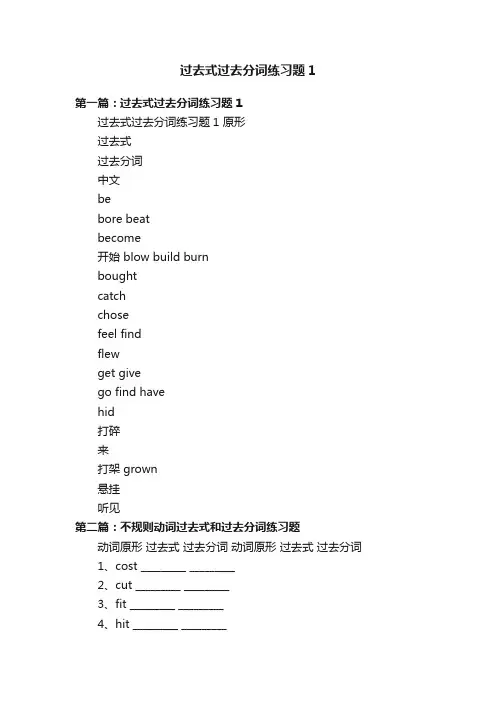
过去式过去分词练习题1第一篇:过去式过去分词练习题1过去式过去分词练习题1 原形过去式过去分词中文bebore beatbecome开始 blow build burnboughtcatchchosefeel findflewget givego find havehid打碎来打架 grown悬挂听见第二篇:不规则动词过去式和过去分词练习题动词原形过去式过去分词动词原形过去式过去分词1、cost _________ _________2、cut _________ _________3、fit _________ _________4、hit _________ _________6、let _________ _________7、put _________ _________8、read _________ _________9、set _________ _________10、shut _________ _________11、spread _________ _________12、buy _________ _________13、bring _________ _________14、catch _________ _________15、build _________ _________16、deal _________ _________17、feed _________ _________18、feel _________ _________19、fight _________ _________ 20、find _________ _________21、get _________ _________22、hear _________ _________23、keep _________ _________24、hang _________ _________25、hold _________ _________26、have/has _________ _________27、lay _________ _________28、lead _________ _________29、leave _________ _________ 30、lend _________ _________31、lose _________ _________32、make _________ _________33、mean _________ _________34、meet _________ _________35、pay _________ _________36、say _________ _________38、send _________ _________39、shine _________ _________ 40、sit _________ _________41、sleep _________ _________42、spell _________ _________43、spend _________ _________44、stand _________ _________45、strike _________ _________46、sweep _________ _________47、teach _________ _________48、tell _________ _________49、think _________ _________ 50、understand _________ _________51、stick _________ _________52、win _________ _________53、spin _________ _________54、come _________ _________55、become _________ _________56、run _________ _________57、begin _________ _________58、is _________ _________59、am _________ _________ 60、are _________ _________ 61、blow _________ _________ 62、break _________ _________ 63、choose _________ _________ 64、do _________ _________ 65、draw _________ _________ 66、drink _________ _________ 67、drive _________ _________ 68、eat _________ _________ 69、fall _________ _________ 70、fly _________ _________ 71、freeze _________ _________ 72、give _________ _________ 73、go _________ _________ 74、grow _________ _________ 75、know _________ _________ 76、lie _________ _________ 77、hide _________ _________ 78、ride _________ _________ 79、ring __________________ 80、rise _________ _________ 81、see _________ _________ 82、shake _________ _________ 83、sing _________ _________ 84、speak _________ _________ 85、steal _________ _________ 86、swim _________ _________ 87、take _________ _________ 88、throw _________ _________ 89、bite _________ _________ 90、burn _________ _________ 91、forget _________ _________ 92、show _________ _________ 93、learn _________ _________ 94、wake _________ _________ 95、smell _________ _________ 96、light(点火)_________ _________ 97、slide _________ _________ 98、wake _________ _________ 99、spoil _________ _________ 100、eat _________ _________第三篇:过去式过去分词测试英语动词过去式过去分词测验 bear _______ _______ 2 beat _______ _______ 3 become _______ _______ 4 begin _______ _______ 5 blow _______ _______ 6 break _______ _______ 7 bring _______ _______ 8 build _______ _______ 9 burn _______ _______ 10 buy _______ _______ 11 catch_______ _______ 12 choose_______ _______ 13 come _______ _______14 cost _______ _______15 cut _______ _______ 16 dig _______ _______ 17 do _______ _______ 18 draw _______ _______ 19 dream _______ _______20 drink _______ _______21 drive _______ _______ 22 eat _______ _______ fall_______ _______ 24 feed_______ _______ feel________ ________ 2 lie ________ ________ 3 find ________ ________ 4 lend ________ ________5 forget________ ________6 learn________ ________ 7 give ________ ________ 8 lay________ ________ 9 grow ________ ________ 10 keep________ ________ 11 hear _______ ________12 hold ________ ________ 13 hit ________ ________14 hide ________ ________ 15 fight________ ________ 16 let ________ ________ 17 leave ________ ________ 18 fly ________ ________ 19 go ________ ________ 20 hang ________ ________ 21 hurt________ ________ 22 know________ ________ 23 have________ ________24 get________ ________ light ________ ________ 2 sit ________ ________ 3 lose ________ ________ 4 make________ ________ 5 sing ________ ________6 shut ________ ________ 7 mean ________ ________ 8 meet________ ________9 show________ ________ 10shine________ ________11shake_______ _______12mistake________ ________ 13 pay ________ ________ 14 read________ ________ 15 set________ ________ 16 send________ ________ 17 sell________ ________ 18 see________ ________ 19 ride ________ ________ 20 ring________ ________ 21 rise________ ________ 22 rise ________ ________ 23 run________ ________ 24 say ________ ________ sleep________ ________ 2 write________ ________ 3smell_________ _________ 4 speak________ ________5 win ________ ________ 6 wear________ ________ 7 speed ________ ________ 8 wake________ ________ 9 spell ________ ________ 10 spend_______ _______11 throw_______ ________12 spread________ ________ 13 stand________ ________14 think________ ________15tell________ ________ 16steal________ ________17 swim________ ________18 teach________ ________第四篇:过去式过去分词的练习.用be的适当形式填空1.This ____ a picture of a school, and that ____ a picture of a factory.2.These _____coats for men, and those _____ coats for women.3.It ____ sunny today, but it _____ rainy yesterday.I hope it ____ fine tomorrow.4.They ____ middle school students last year, but now they ____ college students.5.I _____ a student of English, and my sister _____ a student of history.6.I ______ very glad to see you.7.She _____ often late for school8.On very cold winter days the lake _____ often covered with ice.9.Now some mummies _______ on show in some museums.10.The students _____ often busy with their homework.用have的适当形式填空1.A man _____ a face and two hands, and a clock ____ a face and three hands.2.“They are free” means “ They _____ nothingto do.”3.Uncle Wang _____ neither a radio nor a TV set before but now he _____ both a radio and a TV set.4.Before liberation, the working people _______ not enough to eat or wear, and many of them _____ no house to live in5._____ you a car ? No, but I _____ one last year.用动词的适当形式填空 1.My brother usually _____(get up)at six o’clock.2.The earth ______(go)round the sun.3.The cat _____(catch)mice very well.4.My sister always ________(wash)clothes for me.5.We ______(read)English every morning.6.Kate _______(study)Chinese harder than Peter.7.They ______(do)their homework carefully every day.8.Mary and Rose ________(see)a film once a week.9.Japan _______(lie)to the east of China.10.When spring ______(come), the trees _______(turn)green.11.____ they _____(watch)TV every Saturday evening ? 12.My father _____(not have)his lunch in the factory.He always has it at home.13._____ it _____(take)you one hour to go to school every day ? 14.I ___________(not like)apples.15.We ________(not study)Russian.We study English.16.______John ______(sing)very well ? 17.______the baby ______(sing)very well ?18.Her sister ________(not look)like her mother.选择填空(D)1.The Smiths usually _____ lunch at home.A.haven’t B.hasn’t C.hadn’t D.don’t have(A)2.“ You _____ a class meeting today” said the teacher.A.don’t have B.didn’t h ave C.doesn’t have D.haven’t(C)3.How often _____ a football match ? A.had you B.have you C.do you have D.have you had(C)4.Martin often _____ his model plane on Saturday afternoon.A.fly B.flys C.flies D.is flying(B)5.The little always ____ his hands before he ____ anything.A.was…eat B.washes…eats C.washs…eats D.washes…eates(B)6.Father usually _____ newspapers after supper.A.read B.reads C.is reading D.hasread(A)7.The Blacks often _____ to the cinema on Saturday evenings.A.go B.goes C.have gone D.are going(A)8.People _____ trees in spring every year.A.plant B.plants C.are planting D.have planted(B)9.T om _______to buy some medicine for his cough.A.want B.wants C.has wanted D.is wanting(A)10.Mr Smith has been busy these days, He _____ tired and ______ a good re st.A.feels…needs B.has felt…has needed C.feels…will needs D.is feeling…is needing(B)11.When he was a child, Mother told Tom the earth _______round.A.was B.is C.are D.Were(A)12.From the magazine I learned there ____ no air or water on the moon.A.is B.are C.was D.were(B)13.The farmer told his children that crops _______without water.A.aren’t living B.can’t live C.isn’t living D.doesn’t live(B)14.Even a child knows that Sunday _____after e es C.is coming D.has come(A)15.I’ll return the book to Jack if I_______ him tomorrow.A.see B.will see C.am going to see D.saw(C)16.Mother will do some shopping if she _______free this Sunday.A.is going to be B.will be C.is D.was(D)17.Miss Green will go to the meeting if she _____ better this afternoon.A.feel B.will feel C.can feel D.feels(C)18.If I _____some tickets, I will give you one.A.has got B.will get C.get D.gets(B)19.Mike will come to play with us as soon as he _____ writing the composition.A.finished B.finishes C.will finish D.is finishing(A)20.The students will wait here until their new teacher ______es B.will come C.have come D.is coming(D)20.I go to bed before she _____ “Good night” to her mother.A.say B.had said C.said D.says(A)21.When the meeting ____over , we will go to the dining-room.A.is B.was C.will be D.are(D)22.I ___ at that school ten years ago.A.study B.had studied C.have studied D.studied(D)22.The policeman ______ the thief but found nothing in his pocket.A.has searched B.will search C.is searchingD.searched(C)23.The baby _____ at his mother as soon as he saw her.A.smiles B.smile C.smiled D.had smiled(C)24.What did you do last Sunday ? I _____ the piano at home.A.am playing B.have played C.played D.plaid(D)25.The young man got up very early that morning and _____ not to be late again.A.try B.tries C.tried D.tried(B)26.The car ______ and an old man with glasses came out.A.stops B.stopped C.stoped D.was stopping(C)27.The visitor _____that they would go to the Great Wall the next morning.A.hear B.hears C.heard D.heared(B)28.The policemen _____ the thief while he was sleeping.A.cought B.caught C.catched D.Catch 29.The teacher _____ a map on the blackboard before she gave the lesson.A.hanged B.hung C.hang D.hangs(D)30.Mike _____ out a knife and _____ the paper into pieces.A.bringed…cut B.braught…cutted C.brought…cuted D.brought…cut(A)31.Something ____ from the tree and ____ the boy hard.A.fell…hit B.felt…hitted C.fallen…hitted D.falled…hit(A)32.When ___ his car lost ? A.did Mr Smith find B.did Mr Smith found C.Mr Smith found D.were Mr Smith find(D)33.Mrs Black ____ anything at the shop that day.A.not boughtB.don’t buyC.doesn’t buyD.didn’t buy(A)34.The old man ____ off until the bus started.A.did not get B.has not got C.will not get D.not got(D)35.The teacher ____ what Peter had told her.A.not understood B.understand not C.won’t understand D.didn’t understand(B)36.I ____ at home yesterday afternoon.A.did not be B.was not C.were not D.am not(A)37.Jenny ____ good at sports when she ____ a schoolgirl.A.wasn’t…was B.didn’t…was C.weren’t…is D.isn’t…was(A)38._____ Tom able to speak three languages when he ____ only ten years old? A.Was…was B.did…was C.does…is D.Is…was(A)39.Why ____ she late for schoolthis morning ? A.was B.did C.were D.does(B)40.The people at the meeting _____ surprised at the news.A.are B.were C.is D.did(C)41.Because the parents _____ pleased with their sons homework, they asked him to do it again.A.not were B.did not C.weren’t D.was not(C)42.______ a good time yesterday evening ?A.Did John hasB.Did John hadC.Did John haveD.Had John had(C)43.It rained so hard yesterday that we _____ a good time in the park.A.had not B.have not C.didn’t have D.don’t have(D)44.Betty looks tired, ______ a rest at noon ? A.Had she B.Had she had C.does she have D.did she have(A)45.The policemen ____ into the house as soon as they got out of the car.A.rushed B.rush C.to rush D.rushing(D)46.What ____ when you looked out of the window ? A.have you seen B.were you seeing C.do you see D.did you see(A)47.Peter ____ well as his mother asked him to get up.A.didn’t feel B.doesn’t feel C.hadn’t felt D.wouldn’t felt(D)48.Jack ____ the policemen as soon as he found the spy.A.has called B.had called C.calls D.Called ’第五篇:过去式过去分词和时态练习1.I------(not have)a good rest since I-----(come)my hometown.2.They-----(work)here since the factory-----(open)3.My mother------(teach)English for over twenty years.4.----_____ you ever ____(tell)them all that before ?----No, never.5.I’m very glad because I-----(find)my lost key.6.How long-----you-----(know)her ? For two years.7.-----you ever-----(meet)her ?8.She _________(study)Chinese for a year.9.How long ____ you ____(live)here ?Since 2004.10.How long _____ you _____(stay)here ? For a year.11.Projec Hope ________(build)schools all over China since 1989.12.In the past 15 years, this project _________(raise)moneyand _____(pay)for the education.13.Most people ___________(hear)of Project Hope and _____(give)money.14.Betty and Tony ______(be)here for a year.15.----I ______(buy)the book for two days.----Where ____ you ____ it ?----In Yanghuo market.选择16.----Where is Sam ?----he _______for a month.A.had left B.has left C.left D.will leave 17.Has the match started ?Started ? Finished!Gao yue _____.A.is winning B.wins C.will win D.has win!8----______ has his food store been in business ?----Since 2001.A.How longB.How oftenC.how soon 19.----Is your uncle still smoking ?----Yes.It’s nearly five years _____ he smoke.A.whenB.afterC.beforeD.since 20.Surprised to meet you here.________ since we met last.A.It’s a long timeB.How I miss youC.I haven’t seen you 21.She and I ______ friends since we met in Guangzhou last summer.A.have madeB.have becomeC.have beenD.have turned.-----Where is my little dog ?-----It ______ the back of the house.A.has gone toB.had gone toC.has been toD.had been to 23.What are you going to do this weekend ?I _____ yet.A.haven’t decidedB.won’t decideC.have decideD.didn’t decide 24.-----Would you like to see the film Chicken Run this evening ?-----I’m sorry I _____ it twice.A.seeB.will seeC.have seenD.am seeing 25.----Where is Mrs Smith ?----She isn’t here.She _____ to England.A.has goneB.has beenC.wentD.goes 26.His father _____ the USA for three year.A.has been inB.has gone toC.has leftD.went 27.----What a nice bike!How long _____ you _____it?----Just two weeks.A.will buyB.did buyC.are ,havingD.have , had 28.I _______ this book s for two weeks.I have to return it now.A.borrowedB.have borrowedC.keptD.have kept 29.How long _____ you _____ from the USA.For two e backB.returnedC.got backD.been back 30.Dongdong has _____ Green China for 2 years.A.joinedB.taken part inC.beenD.been a member of 31.----____you _____ China for a long time ?----Yes ,I came here three years ago.A.Have ,come toB.Did ,come toC.Have ,been in 32.Your bike looks nice.Is it new ?----No.I ______ it for two months.A.have hadB.has boughtC.would buy 32.The film _____ on for a few minutes.A.has beenB.wasC.will beD.is 33.----Is your father a Party member ?----Yes.He_____ the Party 3years ago.He ____ A Party Member for 3years.A.joined,has beenB.has joined,has been.C.was joined ,isD.joined ,was 34----They say there is a new restaurant nearby.-----Yes,and it _____ for no more than a week.A.has beenB.openC.is openingD.is opened35.My father ______ on business for two weeks.He’ll return in 3 days.A.leftB.has leftC.has goneD.has been away 36.There will be a parents’ meeting this afternoon.But my parentscan’t come because they_____ to Harbin.A.has gone B.have gone C.has been D.have been 37.He has _______ ror two years.Two years _______ a long time.A.left home , are B.been away from home ,is C.have home , is D.been away from home ,are 38.Hurry up!The film ______ for ten minutes.A.has been on B.has begin C.begin D.had began 39.-----Jack hasn’t p aid for the school things , has he ?-----_______.His father will pay for him.A.Yes ,he did B.No , he hasn’t C.Yes, he did D.No,he didn’t 40.He has never been tothe United States , ______ ? A.isn’t he B.doesn’t he C.hasn’t he D.has he 41.Jim’s never come to school late , ______ ______ ?(改为反意疑问句)42.从我们上次见面已经是个月了。
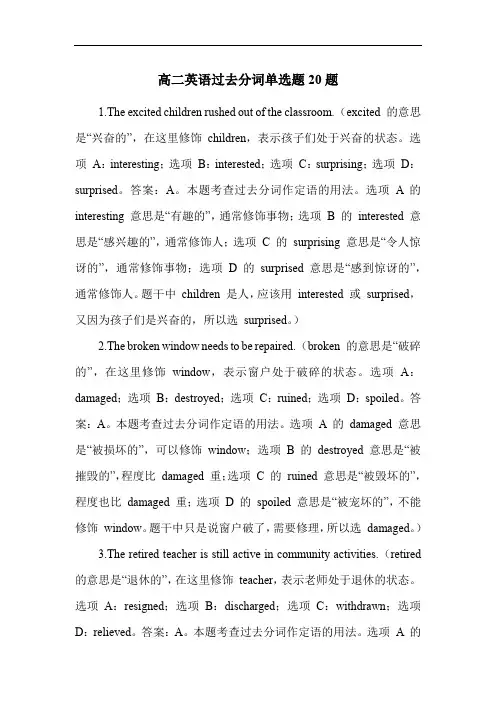
高二英语过去分词单选题20题1.The excited children rushed out of the classroom.(excited 的意思是“兴奋的”,在这里修饰children,表示孩子们处于兴奋的状态。
选项A:interesting;选项B:interested;选项C:surprising;选项D:surprised。
答案:A。
本题考查过去分词作定语的用法。
选项A 的interesting 意思是“有趣的”,通常修饰事物;选项B 的interested 意思是“感兴趣的”,通常修饰人;选项C 的surprising 意思是“令人惊讶的”,通常修饰事物;选项 D 的surprised 意思是“感到惊讶的”,通常修饰人。
题干中children 是人,应该用interested 或surprised,又因为孩子们是兴奋的,所以选surprised。
)2.The broken window needs to be repaired.((broken 的意思是“破碎的”,在这里修饰window,表示窗户处于破碎的状态。
选项A:damaged;选项B:destroyed;选项C:ruined;选项D:spoiled。
答案:A。
本题考查过去分词作定语的用法。
选项A 的damaged 意思是“被损坏的”,可以修饰window;选项B 的destroyed 意思是“被摧毁的”,程度比damaged 重;选项C 的ruined 意思是“被毁坏的”,程度也比damaged 重;选项D 的spoiled 意思是“被宠坏的”,不能修饰window。
题干中只是说窗户破了,需要修理,所以选damaged。
)3.The retired teacher is still active in community activities.(retired 的意思是“退休的”,在这里修饰teacher,表示老师处于退休的状态。
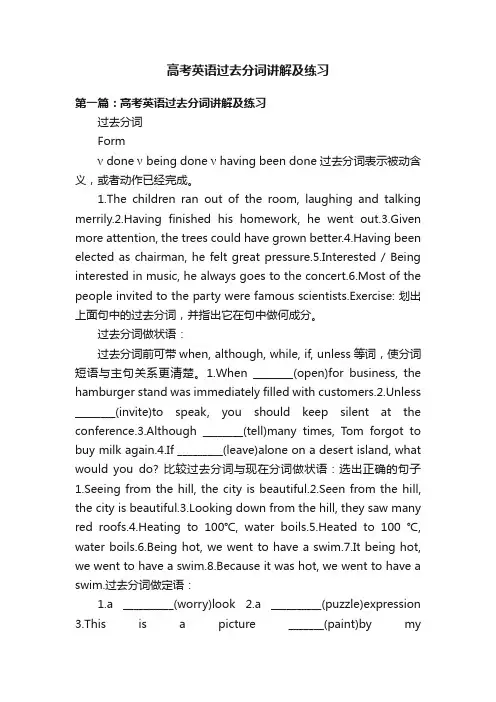
高考英语过去分词讲解及练习第一篇:高考英语过去分词讲解及练习过去分词Formν done ν being done ν having been done 过去分词表示被动含义,或者动作已经完成。
1.The children ran out of the room, laughing and talking merrily.2.Having finished his homework, he went out.3.Given more attention, the trees could have grown better.4.Having been elected as chairman, he felt great pressure.5.Interested / Being interested in music, he always goes to the concert.6.Most of the people invited to the party were famous scientists.Exercise: 划出上面句中的过去分词,并指出它在句中做何成分。
过去分词做状语:过去分词前可带when, although, while, if, unless等词,使分词短语与主句关系更清楚。
1.When ________(open)for business, the hamburger stand was immediately filled with customers.2.Unless ________(invite)to speak, you should keep silent at the conference.3.Although ________(tell)many times, Tom forgot to buy milk again.4.If _________(leave)alone on a desert island, what would you do? 比较过去分词与现在分词做状语:选出正确的句子1.Seeing from the hill, the city is beautiful.2.Seen from the hill, the city is beautiful.3.Looking down from the hill, they saw many red roofs.4.Heating to 100℃, water boils.5.Heated to 100 ℃, water boils.6.Being hot, we went to have a swim.7.It being hot, we went to have a swim.8.Because it was hot, we went to have a swim.过去分词做定语:1.a __________(worry)look2.a __________(puzzle)expression3.This is a picture _______(paint)by myfather.4.__________(pollute)water is harmful to people’s health.Exercise: Rewrite the sentence(1)1.It is a letter which was written in pencil.2.The letter which /that was mailed last night will reach him tomorrow.3.The bridge which was built 100 years ago is still in good condition.4.The teachers are talking about the problem which /that was discussed at the meeting.Exercise:Rewrite the sentence(2)1.When he was left alone, the boy began to cry.2.Kroc was impressed by the cleanliness, service and food, so he looked up at the name over the hamburger stand.3.Although it was started six years earlier, in 1948, McDonald’s was still a small business.4.Though I admit what you say, I still think you should meet him.5.As I didn’t know her address, I could not write to her.Exercise: choose the best answers 1.When ______ help, one often says “Thank you.” or “It’s kind of you.”A.offeringB.to offerC.to be offeredD.offered 2._____ in the mountains for a week, the two students were finally saved by the local police.A.Having lostB.LostC.Being lostD.Losing 3.Linda worked for the Minnesota Manufacturing and Mining Company,___as 3M.A.knowingB.knownC.being knownD.to be known 4.______ the program, they have to stay there for anothertwo weeks.A.Not completingB.Not completedC.Not having completedD.Having not completed 5.Oil prices have risen by 32 percent since the start of this year,_____ a record US$57.65.A.have reachedB.reachingC.to reachD.to be reaching 6._____ his books and clothes into a trunk, he came downstairs.A.Packed B.Having packedC.Being packedD.Packing 7._____ long ago, the letter was illegible.A.WrittenB.Having writtenC.To have been writtenD.Be written 8._____ much education, the poor woman wasn’t able to find a good job.A.Having not hadB.Not having hadC.Having notD.Not had 9._____, it should never be pointed at anyone.A.When carrying a gunB.Carried a gunC.With a gun carryingD.When you carry a gun.10.When _____ different cultures, we often pay attention onlyto the differences without noticing the many paredB.being comparedparingD.having compared 11.____ enough time, they finished their work better than expected.A.GivingB.GivenC.Being givenD.Give 12.The palace, ______ down in 1485, was neverrebuilt.A.burntB.having burntC.to be burntD.burning 13.______ some of this juice---perhaps you’ll like it.A.TryingB.TryC.To tryD.Have tried 14.Most of the artists ______ to the party were from South Africa.A.invitedB.to inviteC.being invitedD.had been invited 15.Having been attacked by terrorists, __________.A.doctors came to their rescueB.the tall building collapsedC.an emergency measure was takenD.warning were given to tourists 16._______ with video tape-recorders, MP3 players _______ far pared …sellB.To compare...will sellparing…is soldD.Being compared…sell 17._______ the host call her name, her heart started to beat fiercely(猛烈地).A.Hearing B When hearingC HeardD When she heard 18.After _______ , our school took on a new look.A.redecoratingB being redecoratedC.having redecoratedD having been redecorated 19.(04江苏)The old man,_________ abroad for twenty years, is on the way back to his motherland.A.to workB.workingC.to have workedD.having worked 20.(04广西)Reading is an experience quitedifferent from watching TV;There are pictures ______ in your mind instead of before your eyes.A.to formB.formC.formingD.having formed 21.(03春招)The manager, _______ his factory’s products were poor in quality, decided to give his workers further training.A.knowingB.knownC.to knowD.being known Exercise:fill in the blanks with the proper forms of the given words.1.Many things _________(consider)impossible in the past are common today.2.He was disappointed to find his suggestion ______(refuse).3.The film _________(show)next month is very ______(touch).4.The bridge __________(build)now will be finished next month.5.Most of the people ___________(invite)to the party were famous scientists.6._________(see)his mother, the baby could not help _______(laugh)7._________(give)more attention, the trees will grow better.8.The machine wants ___________(repair).9.How dare you go in without __________(invite).10.The patient was warned ____________(not eat)oily food after the operation.Exercise: translation 1.李老师不允许学生在这条被污染的河里游泳。
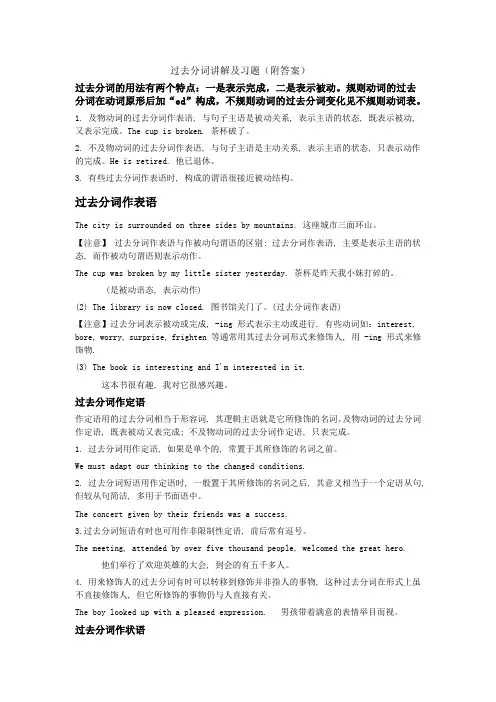
过去分词讲解及习题(附答案)过去分词的用法有两个特点:一是表示完成,二是表示被动。
规则动词的过去分词在动词原形后加“ed”构成,不规则动词的过去分词变化见不规则动词表。
1. 及物动词的过去分词作表语, 与句子主语是被动关系, 表示主语的状态, 既表示被动,又表示完成。
The cup is broken. 茶杯破了。
2. 不及物动词的过去分词作表语, 与句子主语是主动关系, 表示主语的状态, 只表示动作的完成。
He is retired. 他已退休。
3. 有些过去分词作表语时, 构成的谓语很接近被动结构。
过去分词作表语The city is surrounded on three sides by mountains. 这座城市三面环山。
【注意】过去分词作表语与作被动句谓语的区别: 过去分词作表语, 主要是表示主语的状态, 而作被动句谓语则表示动作。
The cup was broken by my little sister yesterday. 茶杯是昨天我小妹打碎的。
(是被动语态, 表示动作)(2) The library is now closed. 图书馆关门了。
(过去分词作表语)【注意】过去分词表示被动或完成, -ing 形式表示主动或进行. 有些动词如:interest, bore, worry, surprise, frighten 等通常用其过去分词形式来修饰人, 用 -ing 形式来修饰物.(3) The book is interesting and I'm interested in it.这本书很有趣, 我对它很感兴趣。
过去分词作定语作定语用的过去分词相当于形容词, 其逻辑主语就是它所修饰的名词。
及物动词的过去分词作定语, 既表被动又表完成; 不及物动词的过去分词作定语, 只表完成。
1. 过去分词用作定语, 如果是单个的, 常置于其所修饰的名词之前。
We must adapt our thinking to the changed conditions.2. 过去分词短语用作定语时, 一般置于其所修饰的名词之后, 其意义相当于一个定语从句, 但较从句简洁, 多用于书面语中。
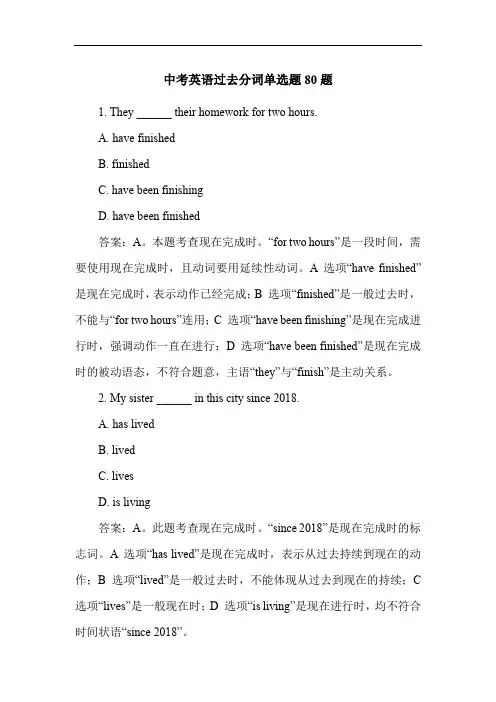
中考英语过去分词单选题80题1. They ______ their homework for two hours.A. have finishedB. finishedC. have been finishingD. have been finished答案:A。
本题考查现在完成时。
“for two hours”是一段时间,需要使用现在完成时,且动词要用延续性动词。
A 选项“have finished”是现在完成时,表示动作已经完成;B 选项“finished”是一般过去时,不能与“for two hours”连用;C 选项“have been finishing”是现在完成进行时,强调动作一直在进行;D 选项“have been finished”是现在完成时的被动语态,不符合题意,主语“they”与“finish”是主动关系。
2. My sister ______ in this city since 2018.A. has livedB. livedC. livesD. is living答案:A。
此题考查现在完成时。
“since 2018”是现在完成时的标志词。
A 选项“has lived”是现在完成时,表示从过去持续到现在的动作;B 选项“lived”是一般过去时,不能体现从过去到现在的持续;C 选项“lives”是一般现在时;D 选项“is living”是现在进行时,均不符合时间状语“since 2018”。
3. The film ______ by many people.A. has been seenB. was seenC. sawD. sees答案:A。
本题考查现在完成时的被动语态。
“by many people”表明是被动关系,且根据语境要用现在完成时。
A 选项“has been seen”符合;B 选项“was seen”是一般过去时的被动语态;C 选项“saw”是主动语态的过去式;D 选项“sees”是一般现在时的主动语态,均不符合题意。
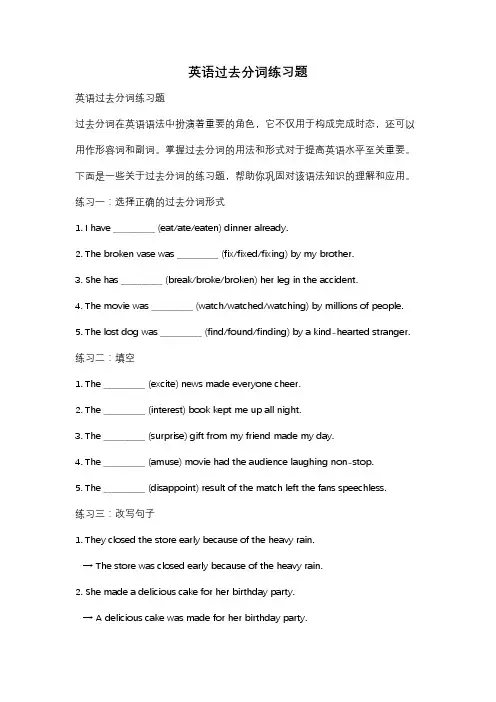
英语过去分词练习题英语过去分词练习题过去分词在英语语法中扮演着重要的角色,它不仅用于构成完成时态,还可以用作形容词和副词。
掌握过去分词的用法和形式对于提高英语水平至关重要。
下面是一些关于过去分词的练习题,帮助你巩固对该语法知识的理解和应用。
练习一:选择正确的过去分词形式1. I have __________ (eat/ate/eaten) dinner already.2. The broken vase was __________ (fix/fixed/fixing) by my brother.3. She has __________ (break/broke/broken) her leg in the accident.4. The movie was __________ (watch/watched/watching) by millions of people.5. The lost dog was __________ (find/found/finding) by a kind-hearted stranger. 练习二:填空1. The __________ (excite) news made everyone cheer.2. The __________ (interest) book kept me up all night.3. The __________ (surprise) gift from my friend made my day.4. The __________ (amuse) movie had the audience laughing non-stop.5. The __________ (disappoint) result of the match left the fans speechless.练习三:改写句子1. They closed the store early because of the heavy rain.→ The store was closed early because of the heavy rain.2. She made a delicious cake for her birthday party.→ A delicious cake was made fo r her birthday party.3. The teacher gave us a difficult assignment.→ We were given a difficult assignment by the teacher.4. He wrote a heartfelt letter to express his gratitude.→ A heartfelt letter was written to express his gratitude.5. They built a new bridge across the river.→ A new bridge was built across the river.练习四:根据上下文选择正确的过去分词形式1. The cake __________ (eat/ate/eaten) by the children at the party was delicious.2. The problem __________ (solve/solved/solving) by the team took a lot of time and effort.3. The broken window __________ (fix/fixed/fixing) by the handyman needs to be replaced.4. The news __________ (announce/announced/announcing) by the principal shocked the students.5. The stolen wallet __________ (find/found/finding) by a passerby was returned to its owner.练习五:选择正确的过去分词形式完成句子1. The __________ (freeze/frozen/freezing) river was a beautiful sight in the winter.2. The __________ (paint/painted/painting) house stood out among the other buildings.3. The __________ (wear/worn/wearing) shoes were too tight for me.4. The __________ (write/written/writing) report needs to be submitted bytomorrow.5. The __________ (break/broken/breaking) vase was a valuable antique.练习六:根据上下文改写句子1. They have finished the project.→ Th e project has been finished by them.2. She has invited all her friends to the party.→ All her friends have been invited to the party by her.3. The chef has cooked a delicious meal for us.→ A delicious meal has been cooked for us by the chef.4. He has taken the dog for a walk.→ The dog has been taken for a walk by him.5. They have planted flowers in the garden.→ Flowers have been planted in the garden by them.练习七:选择正确的过去分词形式完成句子1. The __________ (break/broken/breaking) glass cut his hand.2. The __________ (wear/worn/wearing) clothes were out of fashion.3. The __________ (write/written/writing) letter was sent to the wrong address.4. The __________ (freeze/frozen/freezing) lake was a popular spot for ice skating.5. The __________ (paint/painted/painting) walls brightened up the room.通过以上练习题,希望你对英语过去分词的用法和形式有了更深入的理解。
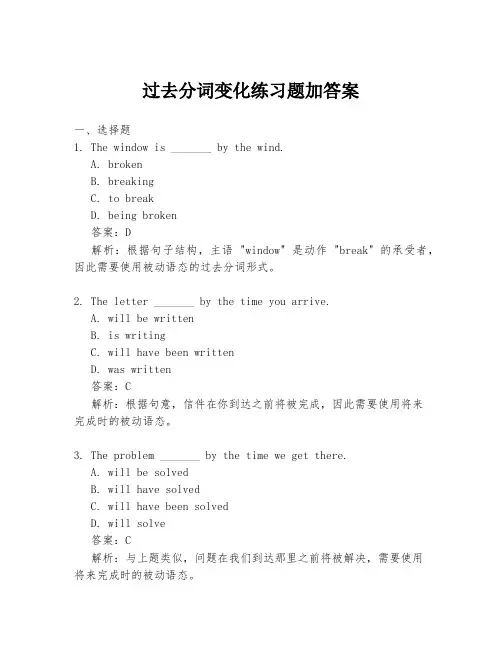
过去分词变化练习题加答案一、选择题1. The window is _______ by the wind.A. brokenB. breakingC. to breakD. being broken答案:D解析:根据句子结构,主语 "window" 是动作 "break" 的承受者,因此需要使用被动语态的过去分词形式。
2. The letter _______ by the time you arrive.A. will be writtenB. is writingC. will have been writtenD. was written答案:C解析:根据句意,信件在你到达之前将被完成,因此需要使用将来完成时的被动语态。
3. The problem _______ by the time we get there.A. will be solvedB. will have solvedC. will have been solvedD. will solve答案:C解析:与上题类似,问题在我们到达那里之前将被解决,需要使用将来完成时的被动语态。
4. _______ by the news, he couldn't sleep well last night.A. SurprisingB. SurprisedC. SurprizedD. Being surprised答案:B解析:"Surprised" 是过去分词,表示他被新闻所惊讶,因此需要使用过去分词作状语。
5. The house _______ in 1990 is very beautiful.A. builtB. buildingC. to buildD. being built答案:A解析:"built" 是过去分词,表示房子是在1990年建造的,作为定语修饰 "house"。
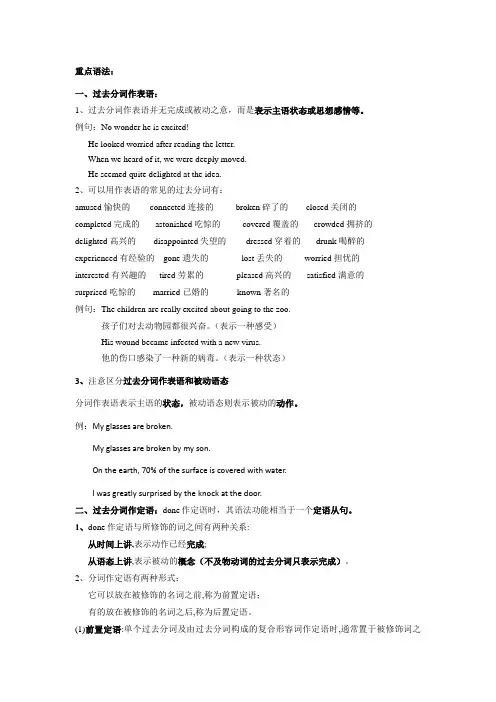
重点语法:一、过去分词作表语:1、过去分词作表语并无完成或被动之意,而是表示主语状态或思想感情等。
例句:No wonder he is excited!He looked worried after reading the letter.When we heard of it, we were deeply moved.He seemed quite delighted at the idea.2、可以用作表语的常见的过去分词有:amused 愉快的 connected 连接的 broken 碎了的 closed 关闭的completed 完成的 astonished 吃惊的 covered 覆盖的 crowded 拥挤的delighted 高兴的 disappointed失望的 dressed 穿着的 drunk 喝醉的experienced 有经验的 gone 遗失的 lost 丢失的 worried 担忧的interested 有兴趣的 tired 劳累的 pleased 高兴的 satisfied 满意的surprised 吃惊的 married 已婚的 known 著名的例句:The children are really excited about going to the zoo.孩子们对去动物园都很兴奋。
(表示一种感受)His wound became infected with a new virus.他的伤口感染了一种新的病毒。
(表示一种状态)3、注意区分过去分词作表语和被动语态分词作表语表示主语的状态,被动语态则表示被动的动作。
例:My glasses are broken.My glasses are broken by my son.On the earth, 70% of the surface is covered with water.I was greatly surprised by the knock at the door.二、过去分词作定语:done作定语时,其语法功能相当于一个定语从句。
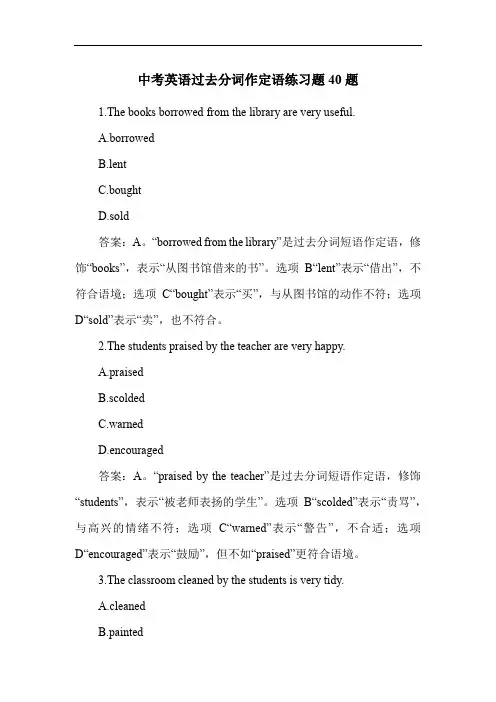
中考英语过去分词作定语练习题40题1.The books borrowed from the library are very useful.A.borrowedB.lentC.boughtD.sold答案:A。
“borrowed from the library”是过去分词短语作定语,修饰“books”,表示“从图书馆借来的书”。
选项B“lent”表示“借出”,不符合语境;选项C“bought”表示“买”,与从图书馆的动作不符;选项D“sold”表示“卖”,也不符合。
2.The students praised by the teacher are very happy.A.praisedB.scoldedC.warnedD.encouraged答案:A。
“praised by the teacher”是过去分词短语作定语,修饰“students”,表示“被老师表扬的学生”。
选项B“scolded”表示“责骂”,与高兴的情绪不符;选项C“warned”表示“警告”,不合适;选项D“encouraged”表示“鼓励”,但不如“praised”更符合语境。
3.The classroom cleaned by the students is very tidy.A.cleanedB.paintedC.decoratedD.repaired答案:A。
“cleaned by the students”是过去分词短语作定语,修饰“classroom”,表示“被学生打扫的教室”。
选项B“painted”表示“粉刷”,不体现整洁;选项C“decorated”表示“装饰”,与整洁关系不大;选项D“repaired”表示“修理”,不符合题意。
4.The homework finished by Tom is very good.A.finishedB.startedC.continuedD.stopped答案:A。
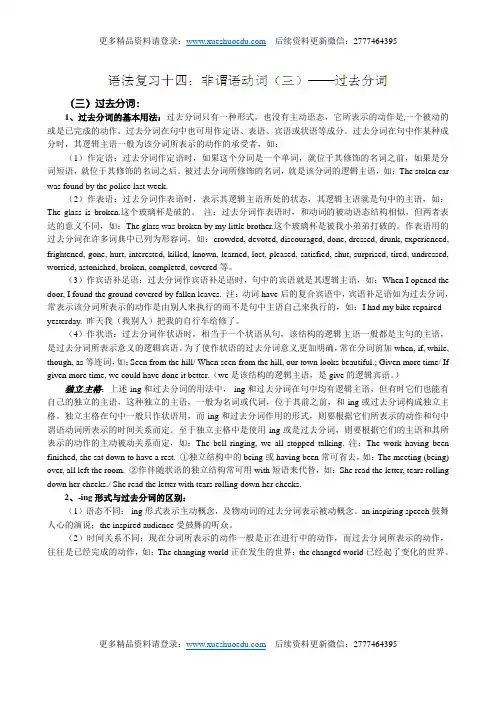
(三)过去分词:1、过去分词的基本用法:过去分词只有一种形式,也没有主动语态,它所表示的动作是一个被动的或是已完成的动作。
过去分词在句中也可用作定语、表语、宾语或状语等成分。
过去分词在句中作某种成分时,其逻辑主语一般为该分词所表示的动作的承受者,如:(1)作定语:过去分词作定语时,如果这个分词是一个单词,就位于其修饰的名词之前,如果是分词短语,就位于其修饰的名词之后。
被过去分词所修饰的名词,就是该分词的逻辑主语,如:The stolen car was found by the police last week.(2)作表语:过去分词作表语时,表示其逻辑主语所处的状态,其逻辑主语就是句中的主语,如:The glass is broken.这个玻璃杯是破的。
注:过去分词作表语时,和动词的被动语态结构相似,但两者表达的意义不同,如:The glass was broken by my little brother.这个玻璃杯是被我小弟弟打破的。
作表语用的过去分词在许多词典中已列为形容词,如:crowded, devoted, discouraged, done, dressed, drunk, experienced, frightened, gone, hurt, interested, killed, known, learned, lost, pleased, satisfied, shut, surprised, tired, undressed, worried, astonished, broken, completed, covered等。
(3)作宾语补足语:过去分词作宾语补足语时,句中的宾语就是其逻辑主语,如:When I opened the door, I found the ground covered by fallen leaves. 注:动词have后的复合宾语中,宾语补足语如为过去分词,常表示该分词所表示的动作是由别人来执行的而不是句中主语自己来执行的,如:I had my bike repaired yesterday. 昨天我(找别人)把我的自行车给修了。
英语过去分词练习题Past Participle Practice Exercises1. Fill in the Blanks with the Correct Past Participle- The window was broken by the strong wind.- She felt relaxed after a long vacation.- The book was written by a famous author.- The cake was eaten by the children in no time.- The flowers were picked for the wedding ceremony.2. Change the Following Sentences from Active to Passive Voice- The teacher graded the exams. → The exams were gradedby the teacher.- They will plant the trees tomorrow. → The trees will be planted tomorrow.- She has cooked the dinner. → The dinner has been cooked.3. Complete the Sentences with the Appropriate PastParticiple- The project was completed on time, much to everyone's relief.- The old building was demolished to make way for a new shopping mall.- The new law was enacted to protect the environment.- The story was forgotten over time, but it was recently rediscovered.4. Use the Correct Form of the Verb in the Sentences Below- After being caught stealing, he was fired from his job. - The room was decorated beautifully for the party.- The book was published in 1995 and became a bestseller. - She was amazed by the beauty of the sunset.5. Rearrange the Words to Form Correct Sentences- were / the / windows / and / doors / locked / all / tightly→ All the windows and doors were tightly locked.- was / the / letter / read / I / before / written → I wrote the letter before it was read.- was / the / movie / watched / I / before / reviewed → I reviewed the movie before it was watched.6. Choose the Correct Past Participle to Complete the Sentences- The room was cleaned / cleansing by the cleaning staff. - The painting was hung / hanging on the wall.- The car was repaired / repairing by a mechanic.7. Translate the Following Sentences from English to Your Native Language, Using the Correct Past Participle- The bridge was completed in 2010.- The novel was translated into several languages.- The house was renovated last year.8. Write a Short Paragraph Using at Least Five PastParticiplesThe old castle, abandoned for centuries, stood overlookedby the modern city. Its eroded walls told tales of the past, and its forgotten secrets were buried deep within its stone foundations.Remember, past participles are often used to form perfect tenses, passive voice, and as adjectives. Practice using them in various contexts to improve your understanding and fluency.。
中考英语过去分词练习题40题1.The classroom is cleaned by the students every day. “cleaned”在这里是过去分词,表被动语态,表示教室被学生每天打扫。
A.cleanedB.cleaningC.cleansD.to clean答案:A。
“is cleaned”是被动语态的结构“be + 过去分词”,B 选项“cleaning”是现在分词;C 选项“cleans”是动词第三人称单数形式;D 选项“to clean”是动词不定式,都不符合被动语态的要求。
2.The homework was done by Tom yesterday. “done”是过去分词,在被动语态中表示作业被汤姆昨天完成了。
A.doneB.doingC.doesD.did答案:A。
“was done”是被动语态,B 选项“doing”是现在分词;C 选项“does”是动词第三人称单数形式;D 选项“did”是动词过去式,都不能用于被动语态。
3.The letter was written by Mary last week. “written”是过去分词,表示信被玛丽上周写了。
A.writtenB.writingC.writesD.wrote答案:A。
“was written”是被动语态,B 选项“writing”是现在分词;C 选项“writes”是动词第三人称单数形式;D 选项“wrote”是动词过去式,都不符合被动语态。
4.The cake was made by my mother for my birthday. “made”是过去分词,在被动语态中表示蛋糕被我妈妈为我的生日做了。
A.madeB.makingC.makesD.make答案:A。
“was made”是被动语态,B 选项“making”是现在分词;C 选项“makes”是动词第三人称单数形式;D 选项“make”是动词原形,都不能用于被动语态。
六年级英语过去分词特殊形式练习题40题1<背景文章>Last weekend, I had a wonderful time. I went to the park with my friends. We played games and had a picnic. After that, I went home and helped my mom with the housework. I swept the floor and washed the dishes. Then I did my homework. In the evening, I watched TV and read a book. It was a great weekend.1. I ______ the floor and washed the dishes.A. sweepB. sweptC. sweepingD. have swept答案:B。
中文解析:sweep 的过去式和过去分词特殊形式是swept,这句话描述的是过去发生的事情,所以要用过去式swept。
2. I went to the park and ______ games.A. playB. playedC. playingD. have played答案:B。
中文解析:play 的过去式是played,因为去公园玩游戏是过去发生的事情,要用过去式。
3. I watched TV and ______ a book.A. readB. readsC. readingD. have read答案:A。
中文解析:read 的过去式和过去分词形式都是read,虽然形式一样,但读音不同,这里是过去发生的事情,所以用read。
4. I helped my mom with the housework. I ______ the dishes.A. washB. washedC. washingD. have washed答案:B。
九年级英语过去分词作定语与表语的区别练习题30题1.The broken window needs to be repaired.A.brokenB.repairedC.cleanedD.painted答案:A。
过去分词broken 作定语修饰window,表示“破碎的窗户”。
repaired 表示“被修理的”,cleaned 表示“被打扫干净的”,painted 表示“被粉刷的”,都不符合语境。
2.The lost book was found by the teacher.A.lostB.foundC.boughtD.read答案:A。
lost 作定语修饰book,表示“丢失的书”。
found 表示“被找到的”,bought 表示“被买的”,read 表示“被读的”,都不符合语境。
3.The closed door kept the noise out.A.closedB.openedC.paintedD.cleaned答案:A。
closed 作定语修饰door,表示“关着的门”。
opened 表示“开着的”,painted 表示“被粉刷的”,cleaned 表示“被打扫干净的”,都不符合语境。
4.The excited children ran to the park.A.excitedB.tiredC.happyD.sad答案:A。
excited 作定语修饰children,表示“兴奋的孩子们”。
tired 表示“疲惫的”,happy 表示“高兴的”,sad 表示“悲伤的”,都不能准确表达孩子们的兴奋状态。
5.The cooked food smelled delicious.A.cookedB.rawC.frozenD.spoiled答案:A。
cooked 作定语修饰food,表示“煮熟的食物”。
raw 表示“生的”,frozen 表示“冷冻的”,spoiled 表示“变质的”,都不符合语境。
最新教学资料·人教版英语过去分词专项练习过去分词两个显著的特点即:从时间上讲,表示动作已经完成;从语态上讲,表示被动的概念,但是如果是不及物动词用作过去分词形式,则只表示动作的完成,而没有被动意义。
如fallen leaves 落叶retired workers 退休工人。
过去分词主要起形容词或副词的作用,表示“被动、完成”的意义,在句中作状语、定语、补足语、表语等。
选择分词时,关键看分词与其逻辑主语的关系,若是其逻辑主语主动发出的动作,选用现在分词;若是被动动作,则选用过去分词。
过去分词用法总结如下:一、表语:1.The cup is broken.2. The door remains locked.3.She looked disappointed.二、定语:要求学生必须掌握过去分词做定语的位置,告诉他们单个过去分词及由过去分词构成的复合形容词作定语时,通常置于被修饰词之前,但修饰代词时,需置于被修饰词之后,而过去分词短语作定语也要后置,即要放在被修饰词之后。
1. We needed much more qualified workers. ( 单个过去分词作定语)2. The girl dressed in white is my daughter. ( 过去分词短语作定语)3. Is there anything unsolved?There is nothing changed here since I left this town.(如果被修饰的词是由every/some/any/no+thing/body/one 所构成的复合代词或指示代词those等时,即使是单个的过去分词作定语,也要放在被修饰词的后面)4. This is a state-owned factory.This is a newly built building.Advertising is a highly developed industry.(单个过去分词与名词或副词构成复合形容词时,放在其修饰的名词前作前置定语)三、宾语补足语:可以带过去分词作宾语补足语的动词有:1)see, hear, find, feel, think等表示感觉和心理状态的动词He found his hometown greatly changed when he came back from abroad.He once heard the song sung in German.Everyone thought the match lost.2) make, get, have, keep 等表示“致使”意义的动词:He’s going to have his hair cut.She had her foot injured in the fall.When you talk, you have to at least make yourself understood.Please keep us informed of the latest developments.( 请让我们了解最新的发展情况。
现在过去分词练习第一篇:现在过去分词练习现在、过去分词练习Now let' s do some exercises:1、用现在分词或过去分词结构改写下列句子: Examples;A student is reading a book over there.He is our monitor.---The student reading a book over there is our monitor.I saw him.He was running for the bus.---I saw him running for the bus.He sat there.He was watching the men at work---He sat there watching the men at work.T om felt tired.He went to bed at once.---Feeling tired, Tom went to bed at once.I had worked for a long time, so I felt very tired.---Having worked for a long time, I felt very tired.The plan is about middle school education.It is being discussed.---The plan being discussed is about middle school education.1)The teacher is taking a walk on the playground.He is our teacher of English.-----The teacher taking a walk on the play ground is our teacher of English.2)The birds filled the air with music.They were singing in the trees.-----The birds singing in the trees filled the air with music.3)Here is a novel.It was written b Lu Xun.-----Here is a novel written by Lu Xun.4)The language is English.It is spoken in Australia.-----The language spoken in Australia Is English.5)Do you know the number of students? They are coming to the English Evening.-----Do you know the number of students coming to the English Evening? 6)I could hear the boys.They were playing in the field.-----I could hear the boys playing in the field.7)He was glad to find the fire.It was burning brightly.-----He was glad to find the fire burning brightly.8)I watched them.They were dancing.-----I watched them dancing.9)I saw a man.He was banging at your door-----Isaw a man banging at your door.10)Tom rushed into the room.He was covered with snow.-----Tom rushed into the room, covered with snow.11)Mary sat on the ground.She talked with Jane.-----Mary sat on the ground, talking with Jane.12)I stood at the gate.I was waiting for his arrival.-----I stood at the gate waiting for his arrival.13)John put on his raincoat because he saw that it was raining.-----Seeing that it was raining John put on his raincoat.14)As he was stepping carelessly off the pavement, he was knocked down by the bus.-----Stepping carelessly off the pavement, he was knocked down by the bus.15)He used chopsticks.He ate his dinner.-----He ate his dinner using chopsticks.16)As he was going downstairs he tripped on the carpet.-----Going downstairs he tripped on the carpet.17)When I was learning English, I had much trouble in pronunciation.-----When learning English, I had much trouble in pronunciation.18)As he himself was one of the exploited Pottier shared their bitterness and sufferings.-----Being one of the exploited himself Pottier shared their bitterness and sufferings.19)The bridge had been weakened by successive storms and was no longer safe.-----Weakened by successive storms, the bridge was no longer safe.20)What is the book? It is being translated.-----What is the book being translated? 21)As we did not know his address we could not get in touch with him.-----Not knowing his address we could not get in touch with him.22)As she had been there many times, she knew the place quit well.-----Having been there many times, she knew the place quite well.23)As we had not got a reply from them, we became quite worried.-----Not having got a reply from them, we became quite worried.24)Because they had been brought up in the city, they knew little about farmwork.-----Having been brought up inthe city, they knew little about farmwork.25)He was a League member.He ought to take the lead in such activities.-----Being a League member, he ought to take the lead in such activities.such activities.2、改正下列句子中的错误(注意分词短语的逻辑主语和句子的主语是否一致)。
精品文档考点一、过去分词作定语1. 单个过去分词作定语。
单个过去分词作定语时,常常放在被修饰的词语之前。
例如:Autu mn comes, and there are many falle n leaves on the street.We must adapt our thi nki ng to the chan ged con ditio ns. 我们必须使我们的思想适应改变了的情况注意:如果单个过去分词所修饰的词语为不定代词nothing,anything,something或指示代词those,this,these等时,过去分词常常放在被修饰的词语后面。
例如:There is nothing cha nged in my hometow n since 1999.2. 过去分词短语作定语。
过去分词短语作定语,常常放在被修饰的词语之后,其作用相当于一个定语从句。
例如:Most of the guests in vited to my birthday party were my school frien ds. = Most of the guests who were in vited to my birthday party were my school frien ds.The concert give n by their friends was a success. 他们朋友举行的音乐会大为成功.3. 过去分词短语有时也可用作非限制性定语,前后常有逗号.The meeti ng, atte nded by over five thousa nd people, welcomed the great hero. 他们举行了欢迎英雄的大会,至U会的有五千多人.4. 用来修饰人的过去分词有时可以转移到修饰非人的事物,这种过去分词在形式上虽不直接修饰人,但它所修饰的事物仍与人直接有关.The boy looked up with a pleased expressio n. 男孩带着满意的表情举目而视注意区别:1. 非谓语动词的被动式作定语的三种形式:the bridge to be built将要建造的桥(表示将来的被动的动作)the bridge being built正在建造的桥(表示正在进行的被动动作)the bridge built造好的桥(表示完成的被动动作)2. 过去分词和-ing分词作定语的区别:过去分词作定语和-ing分词作定语有一定的区别。
试比较下面几组短语:boiled water 开水boiling water 正沸腾的水developed countries 发展的国家developing countries 发展中国家fallen leaves落叶falling leaves正在飘落的叶子changed condition 改变了的情况changing condition 变化着的情况由此可见,过去分词作定语通常表示完成的或被动的动作;而-ing分词作定语可以表示正在进行的主动的动作。
考点二、过去分词作表语1. 过去分词用作表语时,通常说明主语所处的状态或感受等。
例如:I noticed the doors and windows were locked when I came to see him.She seemed terribly shocked upon hearing the sad news.过去分词和-ing分词作表语的区别:过去分词作表语通常表示主语所处的状态或感受,修饰人;而-ing分词作表语多表示主语所具有的特征,修饰物.如:Heari ng the n ews, we felt very surprised.听到那个消息,我们感到很惊讶The news is very surprising. 这个消息很令人惊讶。
They were frighte ned to hear the frighte ning sound. 他们听至U那可怕的声音很害怕。
At the sight of the moving scene, all the people prese nt were moved to tears. 看至U这么动人的情景,所有在场的人者E感动得流下了眼泪。
英语中这样的分词还有很多,如:amus ing, amused; en couragi ng, en couraged; disappo in ti ng, disappo in ted; excit ing,精品文档精品文档excited; puzzling, puzzled; satisfying, satisfied; worrying, worried; tiring, tired; pleasing, pleased; interesting, interested; astonishing, astonished 等。
实战演练:1. The water in this glass is too hot. I prefer some cold ___ water.A. to boil B. having boiled C. boiled D. boiling2. The problem just ______ is an important one.A. to be referred to B. referred to C. referring to D. referred3. ——A man was killed.——Where is the body of the _______ man? A. murder B. murdered C. murdering D. having murdered4. China Daily, first _______ in 1980, is very popular with students of English in China.A. publishedB. was publishedC. having publishedD. having been published5. The great hall was crowded with many people, _______ many children ______ on their parents laps.A. including; seatedB. including; seatingC. including; satD. included; sitting6. ——How did Bob do in the exam this time?——Well, his father seems _____ with his results. A. pleasing B. please C. pleased D. to please7. Prices of daily goods _____ through a computer can be lower than store prices.A. are boughtB. boughtC. been boughtD. buying8. ——What ' s the main purpose of tonight ' s meeting?——We are going to talk about the problem _____ at the last meeting.A. discussedB. discussingC. being discussedD. having discussed9. The first textbooks _____ for teaching English as a foreign language came out in the 16th century.A. having writtenB. to be writtenC. being writtenD. written10. ——How do you deal with the disagreement between the company and the customers? ——The key the problem is to meet the demand by the customers.A. to solving; makingB. to solving; madeC. to solve; makingD. to solve; made Key: 1~5 CBBAA 6~10 CBADB考点三过去分词作宾语补足语及物动词的过去分词作宾语补足语,表示宾语是过去分词动作的承受者,构成逻辑上的动宾关系。
常见的情况有下列几种:一、表示“致使”意义的动词。
如: have, make, get, keep, leave 等。
(1) I'll have my hair cut tomorrow. 明天我要理发。
(2) He got his tooth pulled out yesterday. 他昨天把牙拔了。
(3) Don't leave those things undone. 要把那些事情做完。
(4) He managed to get the task finished on time. 他设法按时完成了任务。
注意:使役动词have 接过去分词作宾补有两种情况。
①主语让别人做某事,强调主语的意志。
如:He had his hair cut yesterday. 他昨天理发了。
Later on the cen ter had a great many new trees pla nted.后来,这个中心让人种了很多树。
②主语遭到某种不幸或陷入恶劣的环境,说明宾语的一种无意识的被动行为。
如:He had his leg broken in the match last month. 他在上星期的比赛中摔断了腿。
He had one eye lost in the war. 在战争中,他失去了一只眼睛。
【高考链接】1. Jenny hopes that Mr. Smith will suggest a good way to have her written English ____ in a short period. ( 福建卷)A. improvedB. improvingC. to improveD. improve2. Helen had to shout _____ above the sound of the music. ( 全国II 卷)A. making herself hearB. to make herself hearC. making herself heardD. to make herself heard 精品文档精品文档二、表示感觉或心理状态的动词. 如: see, watch, observe, look at, hear, listen to, feel, notice, think ,find 等。